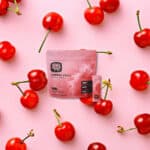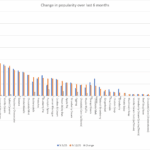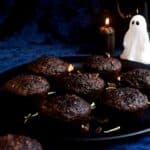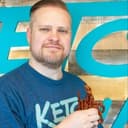
Eating Exclusively Keto Chow For 4 Weeks Experiment Results
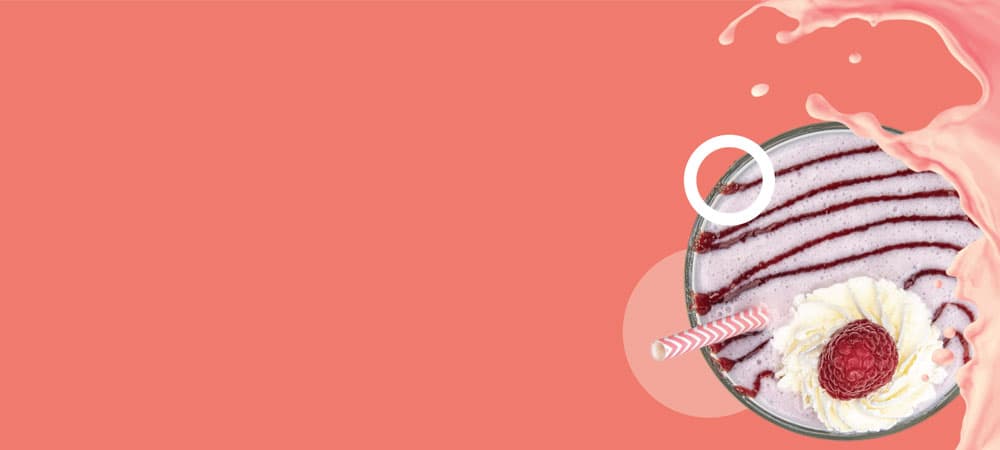
October 20, 2017, I (Chris Bair, that’s me) started an experiment on myself to see what would happen if I ate only Keto Chow for 4 weeks while getting weekly blood tests to monitor my health and what was going on in my body. I also wanted to verify the readiness of a change to the recipe, fit two experiments into one. Here are the results:
I didn't Die
I say that in all seriousness because there are many people that think you will die (or at least not be healthy) if you attempt the sort of thing I did:
- “Your brain requires 200g of carbohydrates a day or you’ll go into a coma”
- “If you don’t chew your food your body can’t regulate hunger and you’ll have health complications”
- “Sucralose will completely mess up your gut bacteria”
- “Dairy will cause inflammation, trigger insulin, and prevent ketogenesis”
- Etcetera…
experiments into one. Here are the results:
experimental Methodology
Food for the experiment:
- My plan was that the only food I would be eating would be Keto Chow. Specifically starting with Keto Chow 2.0.2 for a week and then switching over to a pre-release version of Keto Chow 2.1 – this experiment would serve a dual purpose in allowing me to verify the readiness of the new formula. It’s a slight change but I wanted to be 100% certain it is still awesome.
- Most of the experiment I would be using heavy cream in my Keto Chow, part of the time I would be using avocado oil instead due to a lack of available refrigeration.
- Part of the Keto Chow recipe is fish pills – I would also be taking these to get the necessary EPA and DHA Ω3 fatty acids.
- I would be drinking only water.
- If I started to feel low on salt I had some Redmond Real Salt I could take.
- To eliminate variables I would not be consuming any other sweeteners or calories of any kind. This precluded any kind of gum or soda.
- I would also not be consuming caffeine.
- Water, Keto Chow, Fish pills, salt if I needed it. That’s the list (I did take ibuprofen once too).
Test Plan:
- Before the experiment began I would take a “Control” set of blood tests. This would be an extensive suite of tests, likely the sort of thing a sane person wouldn’t ever do.
- Each week during the experiment I would have a smaller subset of tests to monitor what’s happening, mostly with my lipid system and insulin.
- At the end, I would repeat the original extensive suite of blood tests.
- The first week I would do a test to measure the effect of drinking Keto Chow on my postprandial glucose.
- Every day I would test my blood ketones – I used a “KetoMojo” blood tester for this due to the lower cost per ketone test.
- My weight would be tracked using a Withings scale.
Baseline and Final (“0” and “4”) tests:
- Insulin
- Ferritin, Serum
- CBC With Differential/Platelet
- Vitamin D, 25- Hydro xy
- C-Reactive Protein, Cardiac
- NMR LipoProf +Graph
- Lipid Panel
- Comp. Metabolic Panel (14)
- Homocyst(e)ine, Plasma
- Lp-PLA2 Activity
- Thyroid Cascade Profile
- Apolipoprotein A- 1
- Apolipoprotein B
- Hemoglobin A1c
- Cortisol
- IGF-1
- Reverse T3, Serum
- Vitamin A and E
- Fatty Acids, Free (Nonester)
- T3Free
- Heavy Metals Profile I, Blood
- Zinc, RBC
- GGT
- Iron panel
Food Logs
One of the main criticisms of Morgan Spurlock’s “Supersize Me” is that he absolutely refuses to release his food logs. You can’t take an experiment, even a N=1 experiment seriously unless you can look over the data. Here are my own food logs for the entire experiment. The data was collected using Cron-O-Meter and I made extensive use of “Recipes” in order to save time entering logged food. Unfortunately these abstract the ingredients a bit so here are all the details of the constituent elements of the recipes.
Foods you’ll see in the log:
- Keto Chow Fish Oil
- Source Naturals, Magnesium Malate
- Keto Chow 2.0 Chocolate plus 118ml heavy cream
- Keto Chow 2.0 Chocolate plus 54g Avocado Oil
- Keto Chow 2.1rc1 100ml cream 16.6ml MCT
- Keto Chow 2.1rc1 100ml cream 25ml MCT
- Keto Chow 2.1rc2 100ml Heavy Cream
- Keto Chow 2.1rc2 60ml Avocado Oil
- Keto Chow 2.1rc2 1/2 stick Butter
The Complete Log:
- Complete Food Log (PDF)
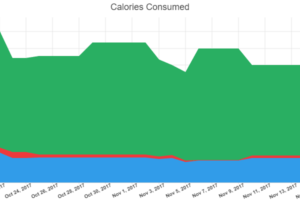
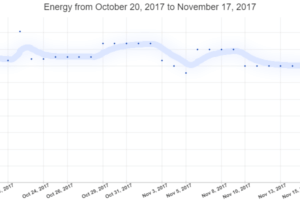
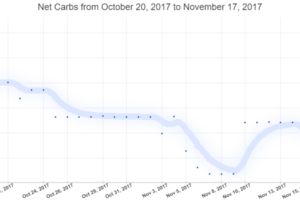
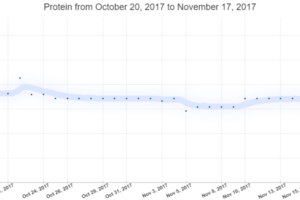
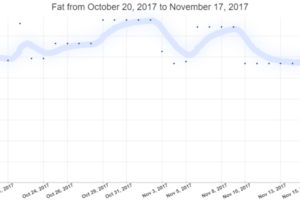
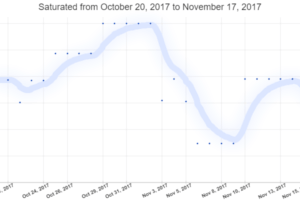
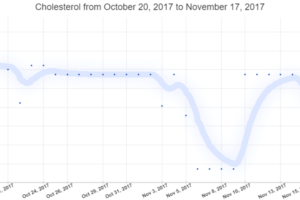
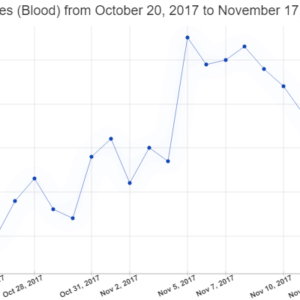 Weight during the experiment:
Weight during the experiment:
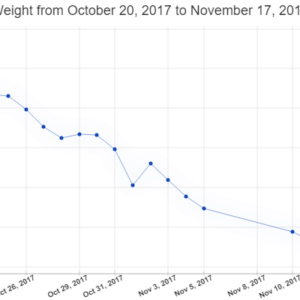
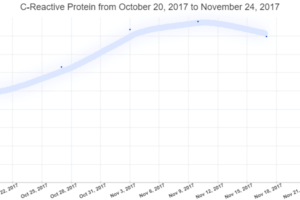
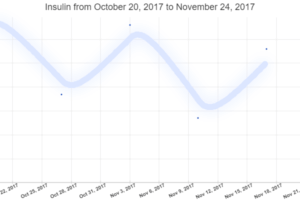
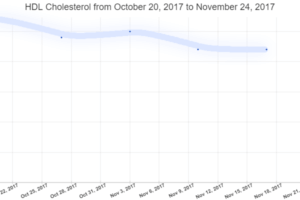
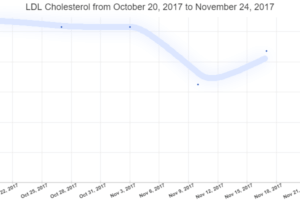
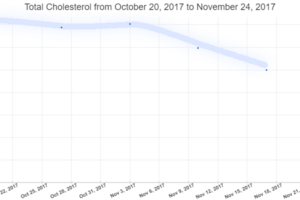
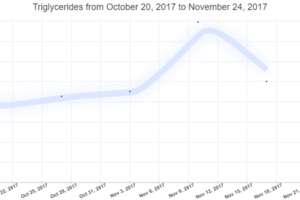
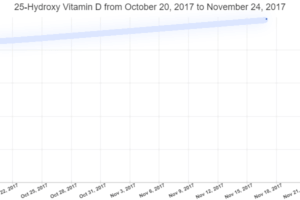
Testing Experience
The best way to read about my experience is by reading the series of blog posts I made during the test:
- n=me experiments – 100% Keto Chow, blood tests, dealing without a fridge
- Keto Chow 2.0 and its effect on my Postprandial Blood Glucose
- N=me experiment: 4 weeks of *ONLY* Keto Chow – 1st week tests back
- N=me experiment: 4 weeks of *ONLY* Keto Chow – 2nd week tests back
- N=me experiment: 4 weeks of *ONLY* Keto Chow – 3rd week tests back
- 4 years of DreamForce, this year: Keto Chow only
My summary of the experiment was that eating ONLY Keto Chow for all my calories reminded me a lot of fasting, so far as the social aspect went. I was frequently turning down food and cooking food for others that I wasn’t going to eat. It really wasn’t terribly difficult to do, just a bit odd. That said, completely removing food as a daily variable was rather nice in a lot of respects. I never experienced heartburn and the only digestive issues I had at the beginning were quickly remedied with some probiotics. My first day eating “real food” (still keto though) I was annoyed at the stuff that was getting stuck in my teeth. Speaking of teeth, many pontificate that not chewing will mess with you somehow: your jaw will get weak, or your teeth will hurt, or whatever if you don’t chew all the time. I experienced absolutely none of that. I had no jaw issues during, nor after the experiment. The only real issue I had was that since I wasn’t even chewing sugar-free gum, my teeth would often feel like they do right after I wake up, with a bit of residue – drinking water would fix that.
Do I plan on doing 100% Keto Chow from now on? No, but since the experiment ended I’ve done Keto Chow for at least 2 meals every day and all 3 on the majority of days. Unless I have family function involving a dinner, I’ve been doing all 3 meals as Keto Chow. I feel like my body can tell the difference and I crave it a bit, it “feels” right.
One thing of note: during the experiment, I wasn’t snacking on anything (except salt and water =) – This was a major change for me and I think has major benefits. Since the experiment ended I’ve continued to not snack anymore. My tummy just feels better too.
Results of the Experiment and Analysis
As asked world-renowned bio-hacker Dave Feldman what he thought of the results of the experiment:
First, I have to really commend Chris for doing this experiment! As an extreme N=1er myself, I appreciate everyone who puts in the serious effort to collect good data. Bravo!Chris has pretty good labs overall. Great general metrics found in his CMP and CBC, low inflammation and generally good lipids.Naturally, I focused quite a bit on the lipids. So I was particularly fascinated at how consistent all of his numbers were with regard to LDL, HDL, and triglycerides — save one particular test, November 10th.As he’s already shared, this was the one period of time where he was using Avocado oil instead of heavy whipping cream. Of course, this meant he was getting more of his fat from mono and polyunsaturated fatty acids as opposed to straight saturated.Not too surprisingly, this resulted in significantly lower LDL of 65 from the 103 in the test just before. However, it also spiked his triglycerides substantially from 113 to 199!But wait, it gets better…While his total LDL particles had the lowest number yet at just 925, his *small* LDL-P jumped to a whopping 713!Fortunately for us, Chris had the follow up experiment succeeding the 10th to confirm everything went back to baseline. All in all, this turned out to be an excellent experiment-within-the-experiment and I’m excited Chris plans to take it a step further next month. 🙂
So, as I said at the beginning: I didn’t die during the experiment. To the contrary, all indications are that my health significantly improved. The test also offered exciting insights into how my lipid system works as an energy delivery mechanism. Particularly telling were my week 3 results.
- My LDL-P (particle count) went down, below the 1000 threshold.
- My LDL-C number went WAY down, by 37% to be specific
- My HDL-C also went down a bit
- My small LDL skyrocketed from 326 to 713
- My Triglycerides went up nearly double from the previous test and more than double my initial test results – this was my highest triglycerides test since I started Keto over 3 years ago.
- My Glucose went down enough to get red flagged
- My fasting insulin level was all the way down to 2.7 uIU/ml
What changed week 3? This was the week I was traveling and didn’t have access to refrigeration, so instead of using heavy cream as my primary fat source, I was using avocado oil. It’s not as tasty as the heavy cream but it has 0g of carbs and doesn’t need refrigeration. The version of Keto Chow I was consuming had only 1.4g of net carbs in it per day which was my total each day – that’s an insanely low number, practically unprecedented and nearly impossible to achieve unless you’re doing “Zero Carb” where you only eat meat (and even then, there’s usually glycogen).
My body had hardly any external glucose, adequate protein, and really a lot of fat coming in (along with fat storage =). Nearly all of the energy I was using was coming from ketones, triglycerides in chylomicrons, or triglycerides in Low Density Lipoproteins. Let’s not forget that the main “job” of LDL doesn’t have anything to do with cholesterol; instead, its main purpose is to transport triglycerides from the liver out to cells for them burn or store. HDL does the opposite, brings it back to the liver.
So here’s my theory as to what was happening based on my limited understanding of the lipid system and what the blood tests show:
- My gut did its job and packaged up the incoming fats in chylomicrons – sent those off to my cells which are very nicely fat adapted and used to burning fat.
- My liver did its job and made VLDL to handle whatever remaining energy was needed.
- My cells did their thing by pulling triglycerides from chylomicrons and VLDL, the depleted VLDLs that become LDLs show up on my NMR test as LDL-P and small LDL-P, like deflated balloons waiting to be reinflated instead of the oxidized LDL that we worry about.
- Not sure what was going on with the HDL going lower, more experiments are likely needed to get a good theory on that.
- Heavy cream is mostly saturated and monounsaturated fat. Avocado oil still has a lot of saturated and monounsaturated but it also contains polyunsaturated fatty acids, adding in the PUFA may have made my lipid system behave differently. Dave says “And overall, I’d prefer the other numbers with the high SFA over the PUFAs, myself.”
So where does this leave us? Well, my original hypothesis that I wouldn’t die was absolutely proven. That third test created some interesting questions that I’d like to figure out. I’m planning on doing another experiment in December 2017 where I do half of my fats as heavy cream and half as avocado oil and see if new blood tests show something in the middle, then another set of tests in January where I do week after week with different types of fats (high in monounsaturated, high in polyunsaturated, high in saturated, etc…). Should be interesting!
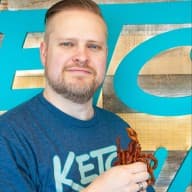
Chris Bair is a technology and computer geek. He became involved in the nutritionally complete "future foods" movement in January 2014, originally with a conventional recipe and later switching to a high fat, low carb "ketogenic" variant on October 2014. In January 2015 he created the recipe for Keto Chow and released it without restriction for anyone to use, at the same time he began mixing the recipe up for people that wanted a finished product and has seen steady growth in the business every month since.

